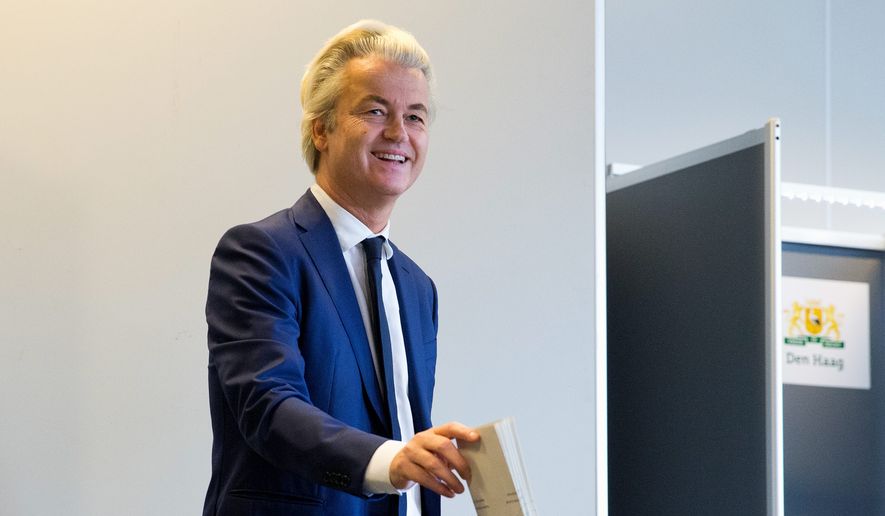THE HAGUE — It was almost exactly two months ago that the political establishment in the Netherlands was basking in praise at home and abroad for turning back the threat of far-right populist politician Geert Wilders and his anti-immigrant Freedom Party, whose disappointing showing left them on the outside as talks on a new government began.
This week, the snail-like pace of the talks on a new coalition government between the mainstream parties broke down completely, in large part because of divisions over Mr. Wilders’ signature issue: immigration.
In a rich bit of political irony, concerns here are mounting that the impasse could benefit the man they were designed to marginalize, Mr. Wilders, who is waiting in the wings.
Edith Schippers, the outgoing health minister leading the negotiations, conceded Monday that the four main parties, including the People’s Party for Freedom and Democracy of Prime Minister Mark Rutte, which finished first in the March 15 poll, had worked hard to reach a compromise but were unable to reconcile their differences in a number of core areas.
“The barrier on migration today proved to be too high,” she told reporters here Monday night. “There was mutual trust, the atmosphere was good, and these four parties tried very hard to go as far as they could.”
While the collapse of the negotiations was sudden, the issue on which it ran aground is no surprise. In an election campaign that was short on drama, immigration was one of the few genuine flashpoints — and the main issue for the far right.
Mr. Wilders and his party, known as the PVV, devoted half of their one-page manifesto to a plan to “de-Islamize” the Netherlands — close the borders to asylum-seekers and Muslim immigrants and shut down all mosques and Islamic schools. The Dutch vote was widely seen as the first of a series of elections on the continent this year measuring the political impact of the Brexit vote in Britain and President Trump’s surprise victory in the U.S. in 2016 — both of which featured immigration as a central argument in the campaign.
Mr. Wilders showed unusual restraint responding to the breakdown of coalition talks on Twitter, calling it “good news” that a coalition of leftist parties known as GroenLinks had not made it into the government.
Despite getting only 13.1 percent in the March vote, Mr. Wilders tweeted this week: “The PVV, as the second largest party in the Netherlands, is ready to serve.”
Intractable differences
Before the election in March, all the other parties ruled out working with Mr. Wilders, even if — as some early polls suggested — the PVV emerged as the largest group, in part because of his hard-line stance on migrants. But once the more mainstream parties sat down around the negotiating table to form a new coalition government, the differences between them proved to be every bit as intractable, say observers.
Mr. Rutte, now the caretaker prime minister, saw the deal that he brokered with Turkey to accommodate Syrian refugees during the Dutch presidency of the European Union last year as a model for future asylum policy: Keep asylum-seekers out of Europe by providing accommodation in neighboring countries.
The Christian Democrats, a regular member of past coalition governments, also took a tougher line on immigration to reflect concerns about Dutch cultural identity. The party is backing sanctions for immigrants who refused to integrate, including withdrawal of residency.
On the opposite side of the table is Jesse Klaver, leader of the left-wing GroenLinks, who wanted to see a more “humane” solution to the refugee question. His party called for more protection for child refugees and those facing persecution for their gender or sexuality, as well as more investment in development aid for countries such as Syria.
The pro-European liberal party D66 took a more moderate line, opposing tighter restrictions for “genuine refugees.” For them the long-term solution was a binding deal to distribute refugees among the countries of the European Union.
Though all four party leaders insisted on Monday night that they had ended the talks by mutual consent, sources quoted in Dutch media pointed the finger at the leftist Greens. According to Algemeen Dagblad newspaper, the talks broke down when GroenLinks rejected a plan to accommodate more refugees outside Europe’s borders.
“Klaver didn’t want to cross that bridge,” a source told the newspaper.
In the absence of the Greens, the three other parties will now look for a new coalition partner, most likely the socially conservative Christian Union. A government including the Christian Union would have the smallest possible majority in both houses of parliament, making it vulnerable to defections or dissent in the ranks.
A return to the negotiating table for GroenLinks can’t be ruled out either, analysts said.
Tom Van der Meer, professor of political science at the University of Amsterdam, said the chances of Mr. Wilders playing any part in the next government were still “very small,” despite his party’s second-place finish in March with 13 percent of the vote.
“There are still plenty of alternatives, and Rutte made it very clear during the election that he wasn’t interested in collaborating with Wilders,” he said. “A lot more will have to go wrong before the PVV comes into the picture.”
Still, the renewed focus on immigration could swing public opinion back behind Mr. Wilders.
“It depends on whether it becomes an issue in wider society again,” said Mr. Van der Meer. “Wilders’ rise in the polls in the last few years went more or less hand in hand with the amount of attention the refugee crisis got in the media.”




Please read our comment policy before commenting.